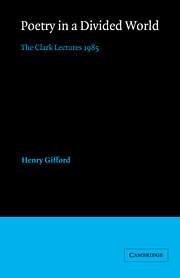1 - The function of poetry at the present time
Published online by Cambridge University Press: 19 September 2009
Summary
Since I am embarking upon an apology for poetry, a brief personal apology may also be allowed. All my teaching life was concerned with English literature, and at a later stage to some degree with American; but most of my spare time went to the study of Russian writers – notably Pushkin and Tolstoy, with a precursor of modern poetry, Fyodor Tyutchev, and so to Blok and Pasternak. In recent years I have become greatly interested in the Russian poets contemporary with Pasternak. To hold in balance two great literatures, English and Russian, is to be made aware of important differences in their traditions, while none the less noting how manifestly they belong to a single culture. My generation, which grew up (to put it charitably) in the nineteen thirties, was plunged immediately into the divided and perplexed era that has continued to this day. We could recognise and abhor fascism, the undisputed evil at the heart of Europe. What too many of us would not concede was that the Soviet Union showed more than a few hideous parallels with Nazi Germany. But those who were drawn to Russian literature, through an original sympathy with Russian politics, did at least have the good fortune to find in it a new perspective for viewing our own literature of the time.
- Type
- Chapter
- Information
- Poetry in a Divided WorldThe Clark Lectures 1985, pp. 1 - 24Publisher: Cambridge University PressPrint publication year: 1986



